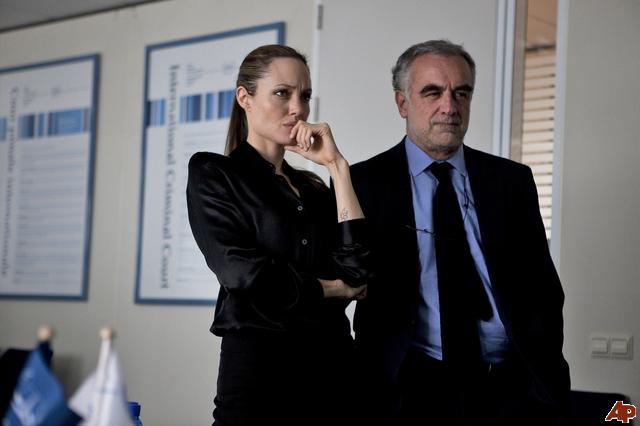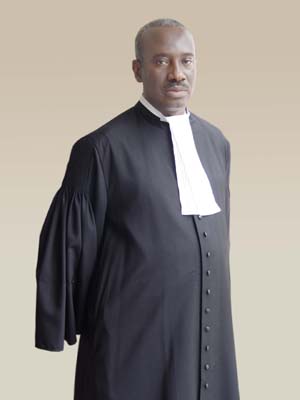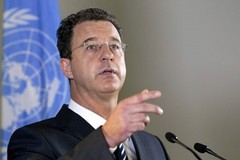Last week, we had a fascinating and lively discussion about some of the criteria and political issues regarding the election of the International Criminal Court’s next Prosecutor. In December, the ICC’s state-members will converge to elect the Court’s second Prosecutor. Prior to that, a search committee will short-list at least three candidates. In the weeks and months leading up to the December election, JiC will feature a series of posts relating to various issues pertaining to the question of the ICC’s next Prosecutor. This week’s post takes a look at some of the possible candidates to succeed current chief Prosecutor, Luis-Moreno Ocampo.
Please note that this list draws on numerous sources interested in this subject. Neither this list nor the characterization of these potential candidates is exhaustive. Some candidates are more feasible than others and new candidates may emerge and will be profiled if they do. Please also keep in mind that the candidates presented here are in no particular order.
Hassan Jallow
Jallow is an interesting candidate for a number of reasons. He is a Gambian lawyer and has been the Chief Prosecutor at the International Criminal Tribunal for Rwanda since 2003. He has previously been the Attorney General and Minister of Justice in Gambia. He has also been a legal expert at the International Criminal Tribunal for the Former Yugoslavia and, briefly, was appointed as judge in the Appeals Chamber at the hybrid Special Court for Sierra Leone (SCSL). This barely scratches the surface of Jallow’s achievements. All in all, Jallow has an extremely impressive resume that would put him in the top-tier of contenders for the ICC’s top job.
Helping his candidacy (as well as Fatou Bensouda’s and Kiril Idris’ below) is the fact that Jallow is African. The origin of a particular candidate may very well play into the decision-making of states. Indeed, the AU has already declared that it will put its weight behind an African candidate, likely to be named in the next few weeks.
Dov Jacobs comments that Jallow’s “stint at the ICTR makes him a sort of safe choice after Moreno-Ocampo, because he follows orders, as his deference to [Rwandan President Paul] Kagame shows.”
One of the most common criticisms levied against Moreno-Ocampo is his penchant to be cavalier and overtly political in his work and his public statements. It could be argued, as Dov’s comments suggest, that Jallow would do neither and would thus make a more constrained and controllable Prosecutor. However, there have also been criticisms from various human rights groups and observers over Jallow’s reluctance to investigate and prosecute alleged crimes by the Rwandan government forces (RPF) prior to and following the 1994 Rwandan genocide. For the ICC to be successful, it must be impartial and apolitical, and the one-sided investigation of Rwanda remains effective fodder for those who maintain that international criminal justice is always and inevitably victor’s justice.
Both the ICTY and the ICTR have begun the process of shutting down operations. There will be key residual mechanisms in place for the foreseeable future, but neither ad hoc tribunal was intended to be permanent. Indeed, the reality that both tribunals will conclude their work during the tenure of the ICC’s next chief Prosecutor will only increase the pressure on the ICC to raise its global significance, its success and its effectiveness.
Some may argue that it would be wiser to keep Jallow (and Serge Brammertz – see below) in his current position as Prosecutor of the ICTR. It would benefit the ICTR to maintain some continuity as it slowly completes its work in the next few years. It also certainly wouldn’t look good for the ICTR (or the ICTY) if its chief employee skipped out to head the ICC’s OTP just when the tribunal was in the midst of slowly shutting down operations, especially with high-profile cases in the dock
It is important to remember that there remains critical work to be done at the ICTR. Earlier this month, Bernard Munyagishari, the alleged “mastermind” of the Rwandan genocide was arrested. This case will be of particular importance to the legacy of the Rwandan Tribunal. While the tribunals may be winding down, there is still much to be done before it closes its doors.
Louise Arbour
Arbour commands the respect of just about everyone I have spoken to, even those who have disagreed with her views and tactics during her long and illustrious career. It is hard to imagine a candidate who has been more involved with issues of justice, human rights and conflict than Arbour. Indeed, she has a remarkably impressive pedigree. The Canadian Arbour has also shown on numerous occasions, particularly in her role as Prosecutor at the ICTY and as UN High Commissioner for Human Rights, that she is tough as nails and not overly worried about annoying state and non-state actors in the defense of principles and values. At the same time, Arbour is one of those rare characters, unlike Moreno-Ocampo, who don’t feel the need to be flashy or use unnecessarily high rhetoric in the way they go about their business.

Louise Arbour, former Prosecutor at the ICTY and UN High Commissioner for Human Rights (photo: Le Devoir)
In his article on the subject of the ICC’s next chief Prosecutor, David Kaye writes that “Moreno-Ocampo is more Del Ponte than Arbour, and the ICC needs an Arbour.” Why name-drop Arbour specifically? Professor William Schabas believes that it is “as if a trial balloon is being floated to promote Louise Arbour’s candidacy.” Schabas goes on to say that Arbour was interested in becoming the Court’s first Prosecutor (what a counter-factual treasure trove!) but was ultimately unsuccessful. Nevertheless, Schabas concludes:
“She would get a lot of support if she wanted to throw her hat into the ring.”
As the current executive director of the International Crisis Group, Arbour would certainly be available and becoming ICC Prosecutor would be a fine way to continue a fine career.
It remains unclear if Arbour is actually interested in the position. According to Mariana Rodriguez-Pareja, Arbour has accepted a position at the Coalition for the ICC, an NGO which seeks to ensure that the ICC is an impartial and independent Court, on an advisory board, which may constitute a conflict of interest. If she was indeed interested in the post, the biggest issue that could come between Arbour and winning the position of Chief Prosecutor could very well be politics. Arbour comes from the West and she has, as noted above, rubbed some the wrong way, including some individuals in the Canadian government. If she does “throw her hat in the ring”, these issues may hobble her chances of becoming the Court’s next Prosecutor.
Serge Brammertz
Similarly to Jallow, Brammertz’s resume also speaks for itself. He was a deputy prosecutor at the ICC under Moreno-Ocampo, he briefly worked at the Special Court for Sierra Leone, and is the current chief Prosecutor at the ICTY. Yet, despite his credentials, few seem to be pushing Brammertz forward to succeed his old boss at the ICC.
As Kevin Jon Heller at Opinio Juris reminds us, the ICTY’s completion strategy, stipulates that the ad hoc tribunal’s judicial work will conclude by the end of 2014. Two of the tribunals most important and most publicly visible trials – of Radovan Karadzic and now of Ratko Mladic – have yet to reach a verdict. It’s uncertain as to whether Mladic’s case will be joined with Karadzic’s in any way but regardless, it will take time for these two cases to be adjudicated. Thus, similarly to the possible candidacy of Jallow, the ICTY may be better served by continuity as it concludes its judicial work.
For some, the fact that Brammertz is Western (he is Belgian) may also be a stumbling block. More importantly however, Brammertz apparently did not have the smoothest of exits from the ICC. It may have been an orchestrated exit but there are suggestions that there were significant disagreements between himself and Moreno-Ocampo which led to Brammertz’s departure. It isn’t a certainty that the next ICC Prosecutor will need the support of Moreno-Ocampo, but someone who has his endorsement, the backing of his keenest supporters and who has also distinguished him or herself would presumably have the inner track.
Fatou Bensouda
There seems to be little doubt that Bensouda, a previous legal advisor and trial lawyer at the ICTR and the current deputy Prosecutor (the number two position in the Office of the Prosecutor) is the people’s choice so far. This is how Kevin Jon Heller, from Opinio Juris, described her:
“She’s brilliant, tough, fair, and the reason that the OTP has not collapsed under the weight of Moreno-Ocampo’s incompetence. She’s also inspiring, having broken though every glass ceiling imaginable in Gambia.”
Others vehemently agreed with Heller’s assessment. Xavier Rauscher also brought up the fact that Bensouda, as the Court’s current deputy Prosecutor, would bring a sense of continuity. It should be remembered, though, that for some critics of the Court’s record so far, this may not be a particularly attractive quality.
The fact that Bensouda is a woman may also affect the preferences of member-states. Mathias Holvoet commented that Bensouda is “African and a woman, so guess she’s simply the perfect candidate!” According to Brigid Inder, executive director of Women’s Initiatives for Gender Justice,
“It is not lost on many states, institutions and NGOs following this election, that the leading African candidate to date is a woman and people are wondering whether this is also a factor in the additional efforts being made this time around to prevent the AU from endorsing a candidate.”
Perhaps the biggest advantage that Bensouda has thus far is the passion with which people support her candidacy. Deborah Nakakye epitomises this passion:
Come July, the AU, an independent institution will endorse Fatou Bensuda as Africa’s only candidate. She has distinguished herself as a hardworking, efficient and effective Prosecutor. If the Court is serious about stumping out impunity, it has got to start from home. The bias shown in not recruiting Africans for high level positions in the Court, the prejudice shown to the Africans will only be brought to an end if the ASP and organisations like the CICC learn to respect Africa and Africans as equal partners. Fatou Bensuda has got everything we need for a prosecutor and not giving this job to her will be the Court’s worst mistake. It is obscene that the idea of having a Prosecutor from a non-States part can even be broached, how unfortunate!!! Fatou, you have done well, you are best suited for the job!!!
Baltasar Garzón
Yes, I can hear the chorus of “are you kidding me?” My answer: sort of, but stranger things have happened.
Garzón famously sought to put former Chilean dictator Augusto Pinochet on trial. After becoming entangled in a legal mess over his efforts to open judicial proceedings concerning victims of the Spanish Civil War, Garzón was offered a position as an advisor to ICC Prosecutor Moreno-Ocampo, which Kevin Heller called “a really, really bad idea.” He was brought to my attention by Dov Jacobs who mused at the possibility of the embroiled and controversial Spanish judge taking up the ICC’s most visible position. I, for one, have a lot of respect and admiration for Garzón for his efforts to awaken Spain’s belated memory politics and confront past human rights abuses. Yet, love him or loathe him, at this point it would be little more than a pipe dream to see him succeed his friend Moreno-Ocampo. Indeed, his close relationship and similar style to Moreno-Ocampo would certainly hurt any possible bid.
Kamil Idris
While Idris has virtually no experience in international criminal law, for many years he was the head of the World Intellectual Property Organization. What is perhaps most fascinating about his potential candidacy is that he is Sudanese. With the possible exception of Gaddafi and Libya, the ICC case in Darfur and the Court’s arrest warrant against Sudan’s President, Omar al-Bashir, is the most controversial. Amongst swirling rumours that Idris may have been short-listed by the search committee set up to identify candidates to be considered for the Prosecutor’s post, the Sudan Tribune quoted Idris, saying he would not consider running unless a compromise on the question of Bashir’s arrest warrant was reached:
“We cannot hand over any Sudanese [citizen] to the International Criminal Court……I cannot accept this position without reaching a settlement.”
The Tribune also quoted the search committee’s secretary who firmly denied that Idris had been selected as a short-listed candidate.
Another problem is that Idris has been directly and personally involved in some controversies, if not scandals, as described in the Tribune’s article. In general, it can be assumed that the search committee, as well as member-states considering various candidates, will by and large be risk-averse, seeking a Prosecutor without a history of questionable personal and professional behaviour.
Lastly, adding to the unlikelihood of Idris becoming the ICC’s Chief Prosecutor, the Sudan Tribune’s senior deputy editor, Wasil Ali, described Idris’ potential candidacy as
“a bluff by Idris himself. He is lying. He has no legal qualifications nor ever stood in court.”
Conclusion
Most of the candidates above satisfy the Rome Statute’s requirement that the Prosecutor “shall be persons of high moral character, be highly competent and have extensive practical experience in the prosecution or trial of criminal cases.” From the above list, the most competent, experienced and likely individuals to become the next ICC Prosecutor are Jallow, Arbour, Bensouda and Brammertz.
All of the candidates have particular advantages which will affect the selection process. Some may be chosen primarily for political reasons, others because of their track-record and personal integrity. In the minds of many, the best outcome and, indeed, an entirely possible outcome would be someone who satisfies both political and merit criteria.
As always, please feel free and welcome to send me the names of any candidates you think would make successful ICC Chief Prosecutors along with your reasoning. I was recently told that we underestimate the role and effect we have on who succeeds Moreno-Ocampo. If so, this is our chance to make a difference.








Errata: Louise Arbour is currently on the Advisory Board of the CICC – see: http://www.iccnow.org/?mod=advisoryboard and NOT on the Independent Panel on Elections launched by the CICC.
For further information on the CICC independent panel on Judicial Elections: http://www.iccnow.org/documents/Judicial_Panel_Announcement.pdf
See terms of reference of the Independent Panel:
Click to access Independent_Panel_on_ICC_Judicial_Elections_-_Terms_of_Reference_12_May_2011_-_final.pdf
In terms of Garzón, I think he should not even be listed. Firstly, he does not speak English, only French and Spanish. Secondly, he has to prepare his defense as he has to face justice in Spain. He won’t run for the ICC until that issue is solved in his homeland. Thirdly, he is now advising the OAS on Colombia (see: http://www.elcolombiano.com/BancoConocimiento/R/rompecabezas_de_la_paz/rompecabezas_de_la_paz.asp)
Thanks Xavier! For the correction re: major posts see the conemmt above. Briefly, the AU points to the lack of an African head of any of the ICC’s organs as an argument for the Prosecutor being an African. It seems like Fatou Bensouda has some serious backing. I wonder who else will emerge as a candidate. The search committee suggests it is seeking at least three people to stand for election.
Two words for an excellent candidate: Navi Pillay
Thanks for sharing your views Deborah! I will include Pillay on an upcoming post.
Hi Mark, a short belated answer.
It’s funny, because I decided to come and tell you that I had recently heard Pillay’s name mentioned a couple of times in the past week. Apparently, I’m not the only one…
Also, on Bensouda, I’m sorry to insist, but as you don’t clearly say it in your post, I’ll repeat what I said in my comment to your previous post on the issue: I find that everybody is brushing aside too easily that she has been working with Ocampo for 8 years, with hardly a squeek of disapproval, at least publicly. I’m not saying this is a definite obstacle to her nomination, and I’ve always been impressed by her in our encounters. But this is an issue that should at least be addressed. I’ve been a vocal critic of Ocampo, but I’m weary of pinning every failure of the OTP on him alone…
Another “comic relief” idea I came up with: Kenneth Star, from monicagate fame…
http://en.wikipedia.org/wiki/Ken_Starr
Pingback: Electing The ICC’s Next Prosecutor: The Criteria at The International Criminal Law Bureau Blog
Pingback: ICC’s Next Top Prosecutor a Done Deal? — Global Memo
what about Morris Anyah,the victims Lawyer in one of the Kenyas cases?i feel he could make a good prosecutor
I concur with Kevin and Mathias.During my time at the Coalition for the ICC, it semeed fairly obvious that Fatou Bensouda was the logical choice for next Prosecutor. Sub-Saharian African, a woman, competent (although, surprisingly enough, I have seen her make some incredible blunders once or twice in Court), and serious. In many ways, the opposite of everything we hate about LMO.She’s a great candidate for both change and continuity, and I feel fairly confident that she will be the ASP’s choice.